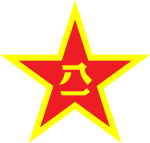Type 89 (tank destroyer)
You can help expand this article with text translated from the corresponding article in Chinese. Click [show] for important translation instructions.
|
| Type 89 self-propelled tank destroyer | |
|---|---|
 PTZ-89 tank destroyer in 1999 | |
| Type | Tank destroyer |
| Place of origin | China |
| Service history | |
| In service | 1989–2015 |
| Used by | China |
| Production history | |
| Designed | 1982 |
| Manufacturer | Norinco |
| Produced | 1989–1995 |
| No. built | 230 |
| Specifications | |
| Mass | 31 tons[1] |
| Length | 5.6m |
| Width | 2.8m |
| Height | 3.12m |
| Crew | 4[1] |
| Armor | 50 mm |
Main armament | 120 mm gun |
Secondary armament | 12.7mm HMG, 7.62mm MG[1] |
| Engine | WR4B-12V150LB diesel 520 hp[2] |
| Power/weight | 16 hp/t |
| Suspension | torsion bar |
Operational range | 450 km[1] |
| Maximum speed | 55 km/h[1] |
The Type 89 tank destroyer (military designation PTZ-89, industrial designation WA320) is a Chinese armored, tracked, tank destroyer vehicle developed by Norinco for the People’s Liberation Army. The vehicle was developed in the 1980s and entered service in 1989.
Development
[edit]Armed with a 120-millimeter smoothbore gun, it was intended to combat newer generations of Western and Russian main battle tanks that were equipped with composite armor and 120 and 125-millimeter caliber guns. Despite a successful development process, with the end of the Cold War it became apparent that the weapon was no longer needed.[3] Production was halted in 1995 after around 100 examples had been built,[3] though the International Institute for Strategic Studies estimated 230 vehicles were built until retirement.[4] An official retirement ceremony was held by the 39th Army Group on 3 November 2015.[5][6]
Operators
[edit] China
China
 People's Liberation Army Ground Force: 230 built and in-store (no longer in active service)[4]
People's Liberation Army Ground Force: 230 built and in-store (no longer in active service)[4]
See also
[edit]References
[edit]- ^ a b c d e 89式120毫米自走反戰車砲
- ^ PTZ89
- ^ a b "Type 89 Tank Destroyer". China Defence Today sinodefence. Archived from the original on 30 January 2009.
- ^ a b The Military Balance 2021. The International Institute for Strategic Studies. 2021. pp. 250–251.
- ^ China to Retire Its Armored Tank Destroyers - Thediplomat.com, 19 November 2015
- ^ "老伙计再见:解放军89式自行反坦克炮开始退役". slide.mil.news.sina.com.cn. Retrieved 11 November 2015.

